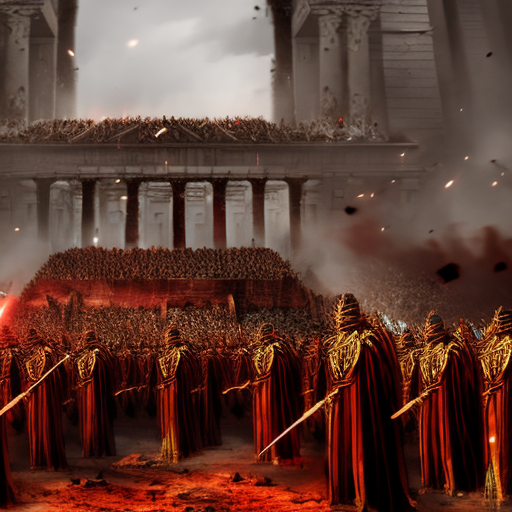One-line summary:
Julius Caesar is a historical tragedy that explores the rise and fall of the Roman dictator, highlighting themes of power, ambition, loyalty, and betrayal.
The Rise of Julius Caesar
Julius Caesar, written by William Shakespeare, is set in ancient Rome during a time of political unrest. The play begins with the celebration of Caesar’s triumphant return from war, where he is hailed as a hero and beloved by the people. However, his popularity and ambition threaten the stability of the Roman Republic, causing concern among some senators, including Cassius and Brutus.
The Conspiracy and Assassination
Cassius, driven by envy and a desire for power, convinces Brutus, a respected and honorable senator, that Caesar’s rule will lead to tyranny. Manipulating Brutus’s sense of duty and love for Rome, Cassius convinces him to join a conspiracy to assassinate Caesar. Despite his own reservations, Brutus agrees, believing that the act is for the greater good of Rome.
On the Ides of March, the conspirators, including Cassius, Brutus, and others, stab Caesar to death in the Senate. Caesar’s dying words, “Et tu, Brute?” (meaning “And you, Brutus?”), reflect his shock and disappointment at Brutus’s betrayal. The assassination sets off a chain of events that will shape the fate of Rome.
The Aftermath and Civil War
The assassination of Caesar plunges Rome into chaos. Mark Antony, Caesar’s loyal friend and ally, delivers a powerful funeral oration that stirs the crowd against the conspirators. This speech ignites a civil war between the supporters of Caesar, led by Antony, and the conspirators, led by Brutus and Cassius.
Despite their initial victories, Brutus and Cassius face internal conflicts and are eventually defeated by Antony and Octavius, Caesar’s adopted heir. The play culminates in the Battle of Philippi, where both Cassius and Brutus meet their tragic ends. Brutus, recognizing the consequences of his actions, chooses to take his own life rather than be captured by his enemies.
Key Takeaways:
- Power and ambition can lead to the downfall of even the most revered individuals.
- Loyalty and betrayal are recurring themes throughout the play, highlighting the complexities of human relationships.
- The consequences of political decisions and actions can have far-reaching effects on society.
- Shakespeare’s portrayal of Julius Caesar serves as a cautionary tale about the dangers of unchecked power and the fragility of political systems.
“Cowards die many times before their deaths; the valiant never taste of death but once.” – Julius Caesar
In conclusion, Julius Caesar is a gripping tragedy that delves into the complexities of power, ambition, loyalty, and betrayal. Shakespeare masterfully explores the rise and fall of Julius Caesar, highlighting the consequences of political decisions and the fragility of political systems. The play serves as a timeless reminder of the dangers of unchecked power and the moral dilemmas faced by those in positions of authority.












